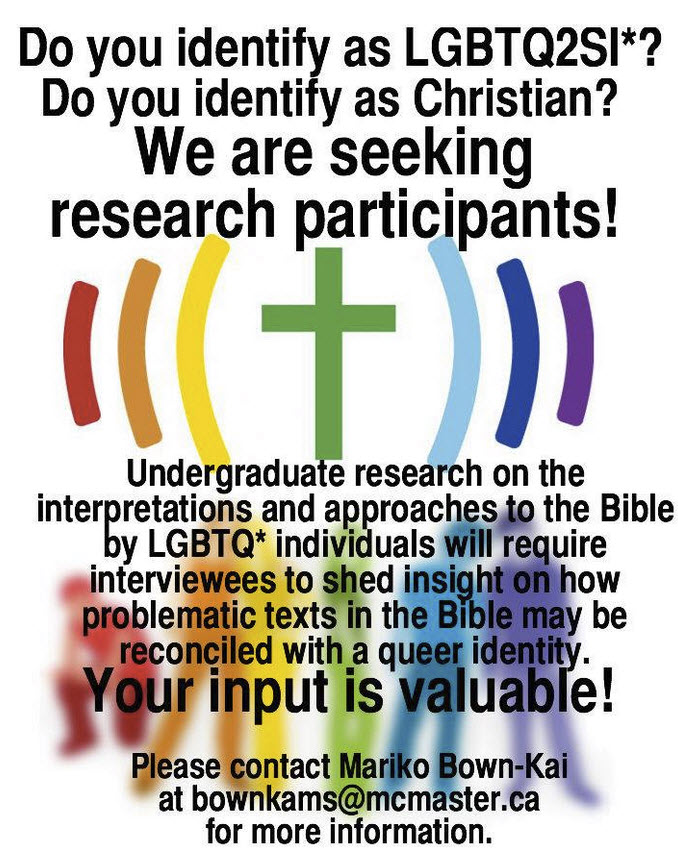So if you qualify – and there are so many letters, including an asterisk, who wouldn’t? – email bowmkams@mcmaster.ca

Notice that reality is immaterial for this research: you don’t have to be a member of the alphabet soup brigade or a Christian, you simply have to identify yourself as such. Similarly, if I choose to identify as a poached egg, I am a poached egg.
The poster is shameless in its admission that the intent of the research is to conform “problematic texts” in Scripture to the demands of a “queer identity”; what a surprise.


That’s called adjusting the evidence to suit your preconceptions…
How incredibly backwards. This is a blatant attempt to try to change God to be better suit sin, rather than an attempt to give up sin to better suit God.
The student/researcher who achieves the highest accomplishment in this study will do so within 60 seconds of the beginning his/her quest to reconcile the problematic texts—–he/she will achieve this reconciliation with a pair of scissors. The lightened and altered Bible will be sent to the ACoC to be enshrined as the “Book of Reconciliation”, and the student will be ordained a bishop, and he/she will burn the expunged texts for “extracted” incense at his/her first service, at which the sermon will be titled;
“Want to sort it out?– Just Cut it Out!”.
A fashion show will follow the service.
This has to be a joke, right? Please tell me it’s a send-up? It has to be.
When we promote apostasy there is no way to stop it. Satan and his angels have been working within the Christian community including the Anglican Communion and the leadership simply stands by and encourages them. What is required is a thorough cleanup within the Anglican Communion which means defrocking the apostate clergy, bishops included, who have openly denounced the vows taken at both their ordination and consecration.
Maybe it is outreach … ?
It is important to note that this is an undergraduate study so it likely will not be seen as academically rigorous as what you’d find published in journals. In other words, this is probably a group of 20 year old students doing a summer research project in order to get an “honours” designation on their bachelor’s degree.
Also, anyone can contact the researcher to find out more about the study. There seems to be a lot of assumptions by people here on what is being done in the study when the information is not known. Why doesn’t someone simply contact the researcher and ask them questions like:
– what methods will you use?
– explain how you will interpret your data (eg. quantitative, vs qualitative, etc)
– can I have a copy of your paper when you are finished?
– how do you choose your research participants?
– what researchers are involved in this study?
– what are your own biases that you are bringing to this study?
– etc
All universities in Canada requires studies like this to go through an ethics committee so these questions should be readily available.
From an academic and even a “regular” person’s point of view, I think that this question is very interesting. The two worlds are mutually exclusive in the eyes of many. Understanding how someone tries to reconcile the two would be interesting to know… even if you don’t think it’s possible.
Pardon my extreme obtuseness, but while I understand LGBTIQ, I’m puzzled by 2SI.
Could someone please enlighten me?
I gather the whole thing stands for “lesbian, gay, bi-sexual, transsexual, queer, two-spirited, and intersex.” I can’t explain what much of that means, though, or the fine distinctions between some of them.
Some people have two sex organs. Are they included in the LGBT group?
They would be “intersex,” or else hermaphrodite, or gynandromorphic, depending on one’s point of view.